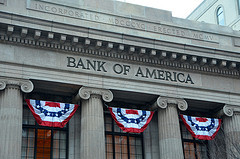Investors Accuse Bank Of America Of Continuing Countrywide’s Bad Practices

(afagen)
The New York Times reports that these investors — all of them fighting a 2011 settlement in which BofA agreed to buy back $8.5 billion in toxic Countrywide loans — filed documents with the court on Friday that claim to demonstrate that the bank was enriching itself while allowing investors to take huge losses.
Among the accusations made by the investors is that while BofA was making loan modifications to homeowners’ first mortgages — meaning investors who held these loans were going to take a loss — the bank did not reduce the principal on second loans and home equity lines of credit. The investors contend that the lowered mortgage payments make it significantly more likely that BofA would recoup its full investment on the secondary loans. This is counter to the standard practice, in which the holder of the second loan is expected to take the loss before the holder of the first loan.
According to the Times, the documents cite one instance in which investors took a loss of more than $300,000 after BofA slashed the principal on a $575,000 loan. Meanwhile, BofA’s $110,000 HELOC on that same property kept its full value. A second example shows investors taking a $395,000 bath on a modified loan, while BofA did nothing to the $170,000 HELOC on the house.
The investors allege that BofA “may have engaged in self-dealing and other misconduct, including in connection with modifications to first lien loans held by the Trusts where BofA or Countrywide held second lien loans on the same subject properties.”
For its part, Bank of America says it did nothing wrong:
“Modifying mortgages for homeowners in severe distress is critical to the ongoing economic recovery and is encouraged by the government at all levels… It is difficult to see how federally regulated entities like the Federal Home Loan Banks would seek to attack that practice which helps families to stay in their homes and in no way violated the contracts at issue.”
The 2011 settlement is still awaiting approval by the court. If these investors are successful in fighting the settlement, the bank could end up paying even more to the plaintiffs.
Want more consumer news? Visit our parent organization, Consumer Reports, for the latest on scams, recalls, and other consumer issues.

